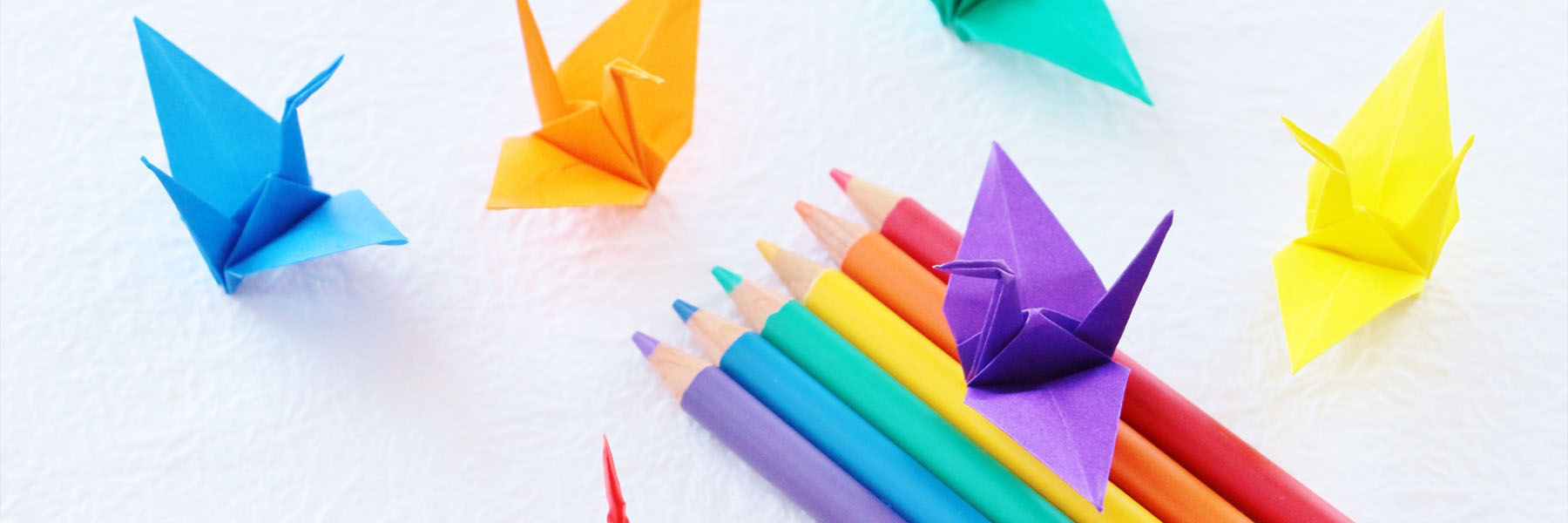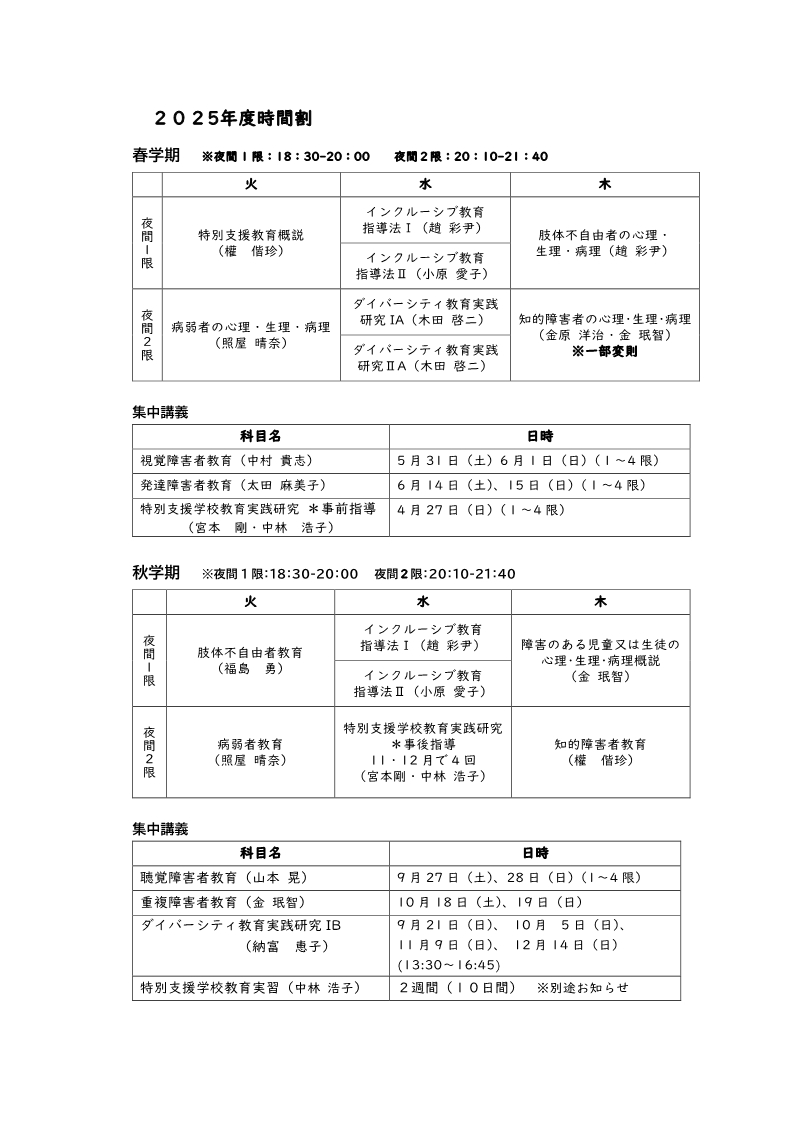- Home
- Undergraduate / Department / Graduate School
- Major
- Special Needs Education Vocational Course
Major
Special Needs Education Vocational Course
In response to the demands of society, we will provide support with a full exemption of tuition fees to promote special support education.
Special Needs Education Vocational Course
Full tuition exemption system
※After enrollment, the tuition fee reduction application procedure is applied, and if certain conditions are met, it will be applied.

Training specialists in special support education
What is a special department (regular student)?
As a teacher training course for incumbent teachers or those who have acquired (expected) a teacher's license, we will teach and study more advanced specialized skills, and individual children have at local educational sites centered on special needs schools The purpose is to train specialists in special support education who can demonstrate problem solving skills to various actual situations and educational needs.
To meet special educational needs
Special Needs Education is "Special Needs Education" that meets special educational needs. In Japan, in order to realize inclusive education, all teachers, regardless of disability, are required to understand the educational needs of each child and respond appropriately to them. In this department, we aim to train faculty members who have a vision of how special support education should be conducted in Japan in the future, based on the history and definition of special support education, changes in related systems and policies, and the actual practice of special support education in other countries.
Special Needs School Teacher Training Course (3 areas: intellectually disabled, physically handicapped, and sickly disabled)
- Required courses…16 subjects
- Elective Subjects…7 subjects (including 3 credits or more must be selected)
- Long-term course system (2 years)
Weekday night classes are easy for incumbent teachers to learn
| Class hours | Month | Fire | Water | Tree | Money |
|---|---|---|---|---|---|
| 18:30-20:00 | ✕ | ● | ● | ● | ✕ |
| 20:10-21:40 | ✕ | ● | ● | ● | ✕ |
- In addition, intensive lectures will be held for about 10 days a year during weekends and summer vacations.
Message from Special Course Students
Living learning backed by theory
He has been working at a junior high school so far, and has obtained a special support school teacher's license in a statutory certification course conducted by the Board of Education. When I wanted to learn more professionally, I learned about my major, and I was attracted to being able to learn without difficulty while working and entered. In my major, there was a lot of learning not only to learn theory, but also to actually think about countermeasures assuming students and make classes. In addition, I was able to learn happily by working hard with the teachers' generous guidance and fellow synchronization friends, and in one year I was able to obtain a kind of special support school teacher license. Currently, I am working at a special support school that I had hoped for. I may be confused by working at my first special support school, but I think that I am able to work with confidence by studying in my major. The major is recommended for teachers who are considering obtaining a license for a special support school teacher.
Joy of learning new perspectives with colleagues
This year, we are in charge of a special support class (intellectual class), and we are practicing "understanding the needs of each individual and optimal learning individually" that we have learned in our major. In the major, there were only fun lectures from the theory that is the basis of instruction to specific instruction based on practical examples. Anyway, it was interesting. Exchange of opinions with peers who take lectures together was also a good opportunity to learn new discoveries and ideas from different perspectives. I will continue to learn so that children can learn optimally. (Elementary school teacher)
State-of-the-art learning that can respond to changes in education
While working in high school, I am learning using the long-term course system. ①You can learn according to the pace of work. ②To learn with friends with the same aspirations. ③To learn cutting-edge knowledge that can respond to changes in education. Everything was the best environment for me. I had a two-license license more than 10 years ago, but through my studies in my major, I strongly felt the need to acquire the ability to respond to various changes with the times. I am very grateful to have the opportunity to learn a new one with the aim of obtaining a kind of license. (high school teacher)
Expertise to cultivate
- 1.
- Based on psychological, physiological and pathological knowledge and diversity understanding.
- 2.
- [Scientific Analysis] and [Problem Solving Capability] from Understanding the Educational Needs of Children
- 3.
- [Coordinating ability] to provide seamless educational support inside and outside the school
- 4.
- [Logic explanation skills] and [communication skills] for multi-occupational cooperation and collaboration
Curriculum
Acquire a total of 30 credits of 27 credits required for obtaining a license and a selection of 3 credits or more are required to complete this course. Courses with parentheses in the number of credits are elective courses.
| Classifications stipulated in the Education Staff License Law Enforcement Regulations | Course Name | Number of credits | Area of Education | Date of opening | Remarks | |||
|---|---|---|---|---|---|---|---|---|
| Central area | Areas containing | |||||||
| Section 1 | Basic Theory of Special Needs Education | Outline of Special Needs Education | 2 | Spring | ||||
| Section 2 | Special Needs Education Subjects | Courses related to psychology, physiology and pathology of infants, children or students with physical and mental disabilities | Psychological, Physiological, and Pathology of Mentally Retarded Persons | 2 | Knowledge | Limb disease Viewing |
Spring | |
| Psychology of people with physical disabilities Physiology and Pathology |
2 | Limbs | Spring | |||||
| Psychology and physiology of the sick. Pathology |
2 | Disease | Spring | |||||
| Courses related to curriculum and teaching methods for infants, children or students with physical and mental disabilities | Education for persons with intellectual disabilities | 2 | Knowledge | Limb disease | Autumn | |||
| Education for the physically handicapped | 2 | Limbs | Autumn | |||||
| Education for the sick | 2 | Disease | Autumn | |||||
| Inclusive Educational Guidance Method I | 2 | Limbs | Full year | Biweekly | ||||
| Inclusive Educational Guidance Method II | 2 | Disease | Full year | Biweekly | ||||
| Inclusive Educational Guidance Method III | (2) | Knowledge | Full year | Biweekly | ||||
| Section 3 | Subjects related to areas other than the special support education area specified in the license | ・Courses related to psychology, physiology and pathology of infants, children or students with physical and mental disabilities ・Courses related to curriculum and teaching methods for infants, children or students with physical and mental disabilities |
Psychological, Physiological and Pathology of Children with Disabilities or Students | 2 | Duplicate LD (Duplicate, LD, ADHD) | Knowledge disease | Autumn | |
| Education for the visually impaired | 1 | Vision | Spring | Concentration | ||||
| Education for the hearing impaired | 1 | Listening | Autumn | Concentration | ||||
| Education for persons with developmental disabilities | 1 | Departure (LD, ADHD, Autism, Emotional, Duplicate) | Shige | Spring | Concentration | |||
| Education for Persons with Disabilities | 1 | Heavy (duplication and language) | Autumn | Concentration | ||||
| Diversity Education Practice Research IA | (1) | Departure (LD) | Spring | |||||
| Diversity Education Practice Research IB | (1) | Departure (LD) | Autumn | |||||
| Diversity Education Practice Research IIA | (1) | Demonstration (ADHD) | Spring | |||||
| Diversity Education Practice Research IIB | (1) | Demonstration (ADHD) | Autumn | |||||
| Diversity Education Practice Research IIIA | (1) | Emotion (emotional) | Spring | |||||
| Diversity Education Practice Research IIIB | (1) | Emotion (emotional) | Autumn | |||||
| Section 4 | Educational training for infants, children or students with physical and mental disabilities | Special Needs Education Practical Research | 1 | Full year | ||||
| Special support education training | 2 | Autumn | ||||||
| Required unit for obtaining a license (a) | 27 units | |||||||
| Completion requirements (a + 3 credits or more must be selected) | 30 units | |||||||
※The curriculum is subject to change.
Fiscal 2025 timetable
Course Students
By taking the necessary credits from the courses offered in Special Needs Education Vocational Course, you can acquire credits for switching from two types of special needs school teacher's license to one type and adding areas. For more information, please refer to the application guidelines for students such as courses and contact us in advance.
2025 Major Courses, etc.
Click here for the procedure documents
- Special Needs Education Vocational Course Course Application Guidelines
- Fiscal 2025 timetable
- Application Form
- Resume
〒751-8510 Shimonoseki City University Student Affairs Department Educational Affairs Divisiton
Inquiries about Special Needs Education Vocational Course
For lessons, please contact Student Affairs Department Educational Affairs Divisiton
[email protected]
For more information about the entrance examination, please contact Admission Department Admission Division
[email protected]








